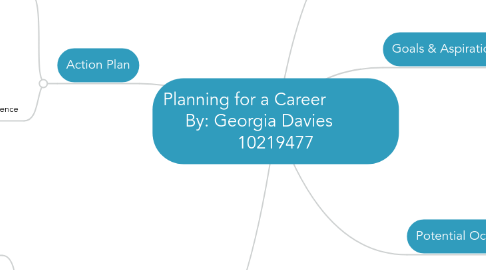
1. Research your options
1.1. Investigate possible occupations
1.1.1. Create a shortlist to explore in more detail
1.2. Obtaining impartial information
1.2.1. Options for progression?
1.2.2. What are the work conditions?
1.2.3. Possible Salary
1.2.4. Qualifications needed?
1.3. Narrowing the search
1.3.1. Speak to someone is in your ideal occupation
1.3.2. Contact the specific company
1.3.3. Gain experience
2. Action Plan
2.1. What degree will you need
2.1.1. consider module choices as the skills and knowledge obtained will influence possible occupations
2.1.2. The degree you choose will you opt for joint honours etc?
2.2. Experience
2.2.1. Internship
2.2.2. Customer service jobs
2.2.2.1. Shows you can interact with customers and/or clients
2.2.3. Skills and personal qualities
2.2.3.1. Employers will be interested
2.2.3.1.1. Extra-curricular activites
2.2.3.1.2. Support with evidence
2.2.3.1.3. Vacation work
2.2.3.1.4. Volunteer work
3. Goals & Aspirations
3.1. Where to you want to be in 10years?
3.1.1. Personally and Professionally
3.2. Do you want to continue your studies at a higher level?
3.2.1. Post-Graduate Study
3.2.2. Graduate Programs
4. Potential Occupations
4.1. Careers Service
4.1.1. Supply information about possible occupations
4.2. Consider supply and demand of possible occupations
4.2.1. Consider other occupations
4.2.2. "A scarcity of graduate applicants in one speciality.... attracts students to the area, with consequent oversupply' (McMillan & Weyers, 2012, p. 419)
4.3. Qualifications
4.3.1. Some occupants may require further qualifications
4.3.1.1. Do you need to complete a postgraduate course?
